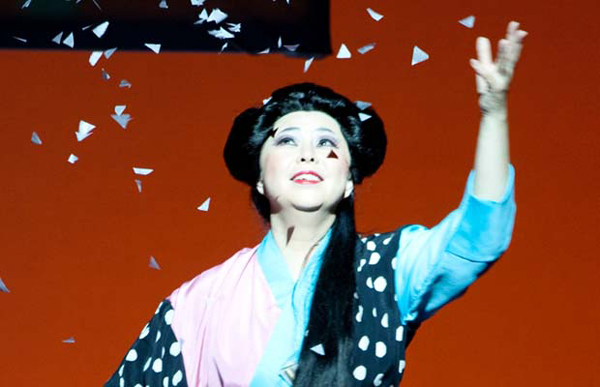Opera is all about the singing, I always thought, until I went to one with an acting teacher. Now I have another layer to appreciate, or not.
Michael won the random draw for a ticket to Madama Butterfly among Tyee readers who would admit they feared opera but were game enough to check out one in person. It turned out to be a bonus for me, and a reminder of why this take-a-newbie series turned out to be more fun than even I expected.
I go to opera because I like stories, which tend to be epic even on a personal scale, and I appreciate a well-designed stage, and a solid orchestra playing timeless music is all good, but the thrills for me invariably come when these vocal freaks of nature take the emotions of everybody in the hall on a ride.
As in the case of Madama Butterfly, the exotic weeper by Giacomo Puccini now being staged by the Vancouver Opera to close its successful season (remaining performances on June 1, 3, 5, 8 and 10).
Married to a doofus
The singing is very fine throughout, with a standout performance by the one artist who needs to be great for the thing to make any sense at all. Mihoko Kinoshita as Cio-Cio-San carries the production with her transition from an innocent child bride in Act 1 to a fatally romantic wife and mother in Act 2. She sings with convincing tenderness in the love duet with her doofus American "husband" but also with growing power in the later stages as events drive her to the brink of tragedy.
SPOILER ALERT: She does not do the sensible thing and hire a life coach to work out her issues about being abandoned, and that sword you see her brandish in the first act isn't just there for decoration.
Kinoshita is also the only person on the crowded stage who moves as if she belongs in Japan. The others tend to lumber through their paces like low-budget Asian movie extras, despite, or perhaps because of, the contribution of a "movement coach," Yayoi Hirano.
It could well have been intentional, this jarring effect of faux Japanese settings and costumes and motions. They were after all played out as a part of the Puccini package, written at a time when European views of the exotic Orient were producing some exciting works in painting and drama as well as music.
Colourful sets, and stereotypes
This production pushes the idea that Madama Butterfly is a modern Western spin on the traditional East by using brightly coloured sets and costumes that could as well have come from another planet as Nagasaki.
The design choices, for me, didn't always work, much as I appreciated the attempt. It was like looking at someone who always dresses stylishly, but you never quite like the style.
No matter where it's set, this is an Italian opera. It's a Puccini work at that, so you may expect some gorgeous melodies, a few dull stretches, characterizations based on ethnic or sexist stereotypes that no one could comfortably pen today, and a colossal effort to get you to cry.
Did it work?
I didn't flood the lower bowl with tears, but I thought the singers were excellent, and the orchestra under conductor Jonathan Darlington just seems to get better with each production offered. I happen to like Puccini, enough to forgive him his flaws which include being too emotionally manipulative at times, but when the talent is up to his score, the results, as in this production, are admirable.
A newbie's review
Michael, the contest winner, turned out to be an acting teacher who trains youth how to perform on the screen. He'd seen an opera 10 years before, curiously enough also a Puccini work, and didn't understand then why the people around him were sobbing. So what did he think of Madama Butterfly?
"I loved it. I'm really glad I came.
"If I'd left after the first act I would have been like: meh. It was interesting enough, but kind of strange the way they would stand and deliver lines to the audience instead of each other. Some of them made the type of mistakes we see in novices, acting only when they deliver their own lines, for example. A few, like the woman who played Suzuki [Zheng Cao], were very good, committed to the role and entirely believable. Others, such as the leads, didn't seem as involved. They might have been great singers -- I don't know the language well enough to judge -- but did you sense any chemistry between them?
"I wonder how long they had to rehearse. If it was only three weeks, it was a great performance. If they had six weeks, not so much.
"With the second act, though, all the exposition from the beginning came together. That's when I got it. I thought the whole thing came to life, and even some of the set designs made sense.
"I really enjoyed it. A few moments I found genuinely moving. I can see now how opera is unapologetically art.
"I want to see more." ![]()
Read more: Music
















Tyee Commenting Guidelines
Comments that violate guidelines risk being deleted, and violations may result in a temporary or permanent user ban. Maintain the spirit of good conversation to stay in the discussion.
*Please note The Tyee is not a forum for spreading misinformation about COVID-19, denying its existence or minimizing its risk to public health.
Do:
Do not: